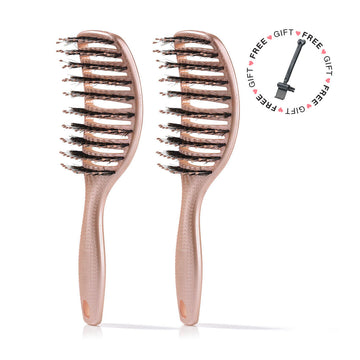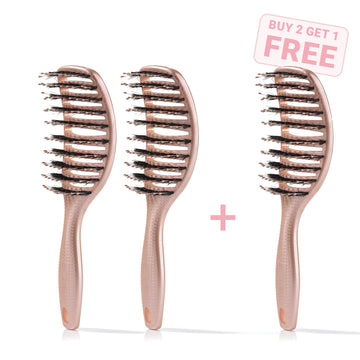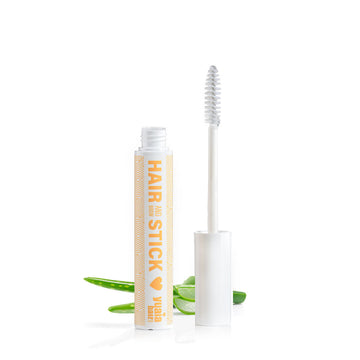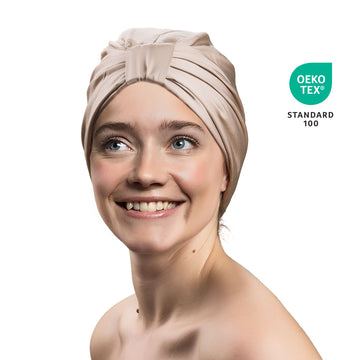
Scalp oil: A natural solution for dry scalp

by Nanna Bundgaard | 18. September 2023 | Reading time: 17 minutes
Read more about the authorScalp oil is a natural and effective solution for treating a dry scalp. This blog post will guide you through the benefits of scalp oil, how to use it correctly, and the best times to apply it. Whether you are dealing with dryness, itching, or irritation, scalp oil can offer a gentle yet effective solution.
Read on to learn more about the potential of this amazing oil to soothe and restore the health of your scalp. You'll also discover how different oils can target specific issues and how you can create your own customized oils at home for optimal care.
What is scalp oil?
Scalp oil is a natural oil used to treat dry scalp. It contains nourishing ingredients that moisturize and soothe the skin on the scalp. The oil helps restore balance to the scalp and reduces itching and irritation. With regular use, scalp oil can improve hair health and provide a more hydrated, well-groomed feel.
In addition to relieving dryness, scalp oil can also have a positive effect on hair growth. Some types of scalp oils stimulate blood circulation in the scalp, which promotes better nourishment to the hair roots and thereby supports the growth of new hair strands. By choosing the best scalp oil for your needs, you can not only reduce discomfort in the scalp but also experience fuller and healthier hair growth over time.

What is scalp oil made of?
Natural plant oils are used as the main ingredient in scalp oil. These oils help moisturize and nourish dry scalps , promoting normal hair growth. Essential oils are also added for their aromatic properties as well as their beneficial effect on the scalp. Vitamin E is an important ingredient as it protects against free radicals and nourishes both the hair and the skin on the scalp. There are many different ingredients that can be added to scalp oil to improve its effectiveness and provide additional benefits. Some of the most common ingredients that can be put into scalp oil include:
1. Tea tree oil: Tea tree oil is known for its antibacterial and antifungal properties. It can help fight dandruff and reduce itchiness and scalp irritation.
2. Lavender oil: Lavender oil has calming and relaxing properties. It can help relieve itching and soothe the scalp.
3. Rosemary oil : Rosemary oil stimulates blood circulation in the scalp and can help promote hair growth. It also has an antiseptic effect and can help reduce dandruff.
4. Peppermint oil: Peppermint oil has a cooling and soothing effect on the scalp. It can help reduce itching and irritation and provide a refreshing sensation on the scalp.
5. Jojoba oil : Jojoba oil is known for its ability to mimic the skin's natural oils. It helps to moisturize and nourish the scalp without leaving a greasy feeling. Jojoba oil can also help reduce dryness and itching.
6. Almond oil : Almond oil is rich in vitamins and minerals that contribute to the health of the scalp. It helps moisturize and soothe dry scalps and can also strengthen hair and reduce hair loss.
7. Argan oil : Argan oil is rich in antioxidants and essential fatty acids that nourish the scalp and improve hair elasticity. It can help reduce dryness and itchiness as well as strengthen hair and prevent damage.
8. Coconut Oil : Coconut oil has antimicrobial properties that can help fight dandruff and reduce itching and irritation. It also moisturizes the scalp and leaves the hair shiny and healthy.

How does scalp oil work?
Moisture and nourishment: Scalp oil works by moisturizing and nourishing the scalp, helping to restore the natural balance and prevent dryness. The natural oils penetrate deep into the skin and form a protective barrier that retains moisture and prevents the scalp from drying out. This can be especially beneficial in cold or dry climates where the scalp tends to lose its natural moisture more quickly.
Relieves itching and irritation: By soothing the scalp, scalp oil can relieve itching and irritation caused by dryness or other factors. This soothing effect comes from the natural anti-inflammatory properties in many scalp oils, which reduce redness and irritation. This makes scalp oil an ideal solution for individuals suffering from eczema or psoriasis, who often experience itching and discomfort in the scalp.
Strengthens hair roots: Scalp oil stimulates the hair roots by providing them with essential nutrients, strengthening the hair from the roots for a healthier appearance. With regular use, scalp oil can help prevent hair breakage and promote stronger and thicker hair. The hair strands also become more resistant to external damage such as heat and styling products.
Increases blood circulation: By massaging scalp oil into the scalp, blood circulation is increased, providing better oxygen and nutrient supply to the hair follicles. This promotes healthier hair growth and makes the hair stronger over time. Improved blood flow can also help remove waste products and dead skin cells from the scalp, creating a more optimal environment for hair growth.
Benefits of scalp oil
The benefits of scalp oil are many. Scalp oil reduces dryness and itchiness, resulting in a more comfortable and healthy scalp. In addition, the oil also promotes hair growth by supplying nourishment to the hair roots. By soothing inflammation and irritation, the scalp oil helps keep the skin healthy and free of unpleasant symptoms. With its natural properties, scalp oil is an ideal solution for those who want an effective treatment for scalp dryness.
Reduces dryness and itching
Essential oils improve the scalp's moisture level and nutrient content. Emollient ingredients relieve dryness in the scalp, while natural antioxidants protect against environmental damage. Scalp oil is the ideal solution to reduce dryness and itching while promoting healthy hair growth and soothing inflammation and irritation in the scalp.
Additionally, scalp oil helps rebuild the skin's natural barrier, making the scalp more resistant to future drying issues. With regular use, you can experience less itching and find a natural solution for dry scalp without compromising on results.

Promotes normal hair growth
Stimulating oils like rosemary, lavender, and tea tree increase blood circulation in the scalp, promoting normal hair growth. These natural ingredients also contribute to strengthening and thickening the hair strands for a fuller appearance. Additionally, they have anti-inflammatory properties that soothe and care for the scalp for a healthier growth environment.
With regular use of scalp oil, hair follicles can better absorb the necessary nutrients, further supporting healthy hair growth. The oil also acts as a protective barrier against environmental factors that can weaken the hair, ensuring that your hair remains strong and healthy over time.
Soothes inflammation and irritation
Antibacterial oils like tea tree and lavender effectively combat infections on the scalp, while ingredients with anti-inflammatory effects relieve irritation. Moisturizing components also help soothe reactions and relieve inflammation in the scalp. With these properties, scalp oil is a natural solution to combat inflammation and irritation in the scalp.
Scalp oil can also reduce symptoms of conditions like eczema and psoriasis, which often cause uncomfortable itching and inflammation. With regular use, you can experience a more balanced and healthy scalp, where irritations are reduced, and the skin feels more soothed and hydrated.
How to use scalp oil
Using scalp oil is an effective way to care for and improve your scalp's health.
To achieve the best results, it is important to choose the right oil that suits your needs, apply it correctly, and ensure that you rinse your hair properly afterward.
In the following points, we will delve deeper into how to choose the right oil, apply it correctly, and get the most out of your treatment.
Choose the right type of scalp oil
To achieve the best results, it is important to choose a scalp oil that suits your specific needs.
Start by understanding your scalp: Is it dry, oily, or flaky? Based on this, you can assess whether you need an oil with moisturizing, soothing, or cleansing properties.
There are different types of oils, each with unique benefits:
- Coconut oil: Promotes hydration and shine
- Tea tree oil: Reduces itching and combats dandruff
- Argan oil: Nourishes and strengthens the hair
- Lavender oil: Soothes the scalp and reduces irritation.
- Rosemary oil: Stimulates blood circulation and promotes hair growth.
- Jojoba oil: Mimics the skin's natural sebum and helps restore moisture balance.
Apply the oil to the scalp and massage in
Divide the hair into sections for easy application. Use your fingertips to massage the oil into the scalp, ensuring that the entire area is covered thoroughly.
By dividing the hair into smaller sections, you ensure that the oil is evenly distributed and reaches all areas of the scalp. A gentle massage in circular motions can also help stimulate blood circulation, promoting a healthy scalp and hair growth.
For a more in-depth treatment, you can leave the oil on overnight.
Let the oil work and rinse the hair thoroughly
Cover your hair with a shower cap or a warm towel so the oil can penetrate deep into the scalp and nourish your hair. Wait at least 30 minutes before rinsing oil out of hair to ensure optimal effect of the product. Use shampoo to remove excess oil and clean both your hair and scalp effectively.

When should you use scalp oil?
Scalp oil can be used to relieve dry and itchy scalp. The natural ingredients in the oil help moisturize the skin and reduce irritation.
If you experience hair loss or have thin hair, scalp oil for hair growth can be an effective solution. The oil nourishes the hair follicles and strengthens the hair, promoting healthy hair growth.
For dry and itchy scalp
Dehydrated scalp can be the cause of dry and itchy scalp. It is important to restore the moisture balance of the scalp to relieve the discomfort. Scalp oil can be a natural solution as it contains nourishing ingredients that help replenish the skin's hydration.
Eczema or psoriasis of the scalp can also cause dryness and itching. If you suffer from these conditions, the use of scalp oil can help to calm the irritation and reduce the inflammation.
Regular blow-drying and heat styling can dry out both the hair and the skin on your scalp. Using an effective hair protection spray or the best scalp oil for your needs before the styling process will not only protect your hair from heat damage but also help retain moisture in your skin for a healthier and more comfortable scalp experience.
For hair loss or thinning hair
Rebuilding the hair follicles, increasing blood circulation to the scalp and stimulating normal hair growth are important factors in the treatment of hair loss or thinning hair. By using scalp oil regularly, you can achieve these benefits and improve the health of your hair.
- The scalp oil nourishes and rebuilds weakened hair follicles, which can help reduce or stop hair loss.
- It increases blood circulation to your scalp, which ensures better nutrition for your hair roots.
- The oil also stimulates the growth of new hair strands, resulting in normal hair.
By incorporating scalp oil for hair growth into your daily care routine, you will experience visible improvements in your hair's appearance and strength.

After using strong hair products
Removing product residue from the scalp can be essential after using strong hair products. A natural solution is to use scalp oil, which effectively cleans and soothes the skin without chemicals. At the same time, the oil provides increased moisture supply to dried out skin, which contributes to a healthier and more well-groomed scalp. With its true scrubbing effect, this oil is an ideal choice for those who want to care for their hair in a natural way without compromising on results.
Are you looking for an effective solution to problems such as dryness or itchiness in your scalp? If you often use strong products in your hair care, it can result in excess product residues on your skin from, among other things, styling or shampoos. To remove these residues from your scalp, it is recommended to use a natural and gentle method such as scalp oil, alternatively you can also use a scalp scrub . This oil not only thoroughly cleans your pores, but also provides intense moisturizing properties for parched skin as well as a deep scrubbing effect - all without the use of chemicals or aggressive ingredients.
How often should you use scalp oil?
Scalp oil can be a useful addition to one's hair care routine as it can help keep the scalp healthy and the hair shiny. However, how often you should use scalp oil depends on your individual needs and hair type.
In general, it is recommended to use scalp oil once or twice a week. This can help maintain a healthy scalp by providing the necessary moisture and nourishment. If one tends to have a dry or itchy scalp, it may be beneficial to use scalp oil more often, perhaps every two or three days, to alleviate these problems.
On the other hand, if you have an oily scalp or tend to get oily hair quickly , frequent use of scalp oil can lead to an even oilier scalp. In this case, it may be best to use scalp oil more sporadically, e.g. once a month or as needed.
It is also important to adjust the frequency based on the season. In winter, when the air is often dry, the scalp may need extra moisture, which may mean more frequent use of the oil. In summer, when sweat and heat can increase oil production, it may be advantageous to reduce use to avoid an oily scalp.
How to make your own homemade scalp oil
Making your own scalp oils at home is a fantastic way to ensure that you are using natural and effective ingredients to care for your scalp and hair. By customizing the recipes to your needs, you can create the perfect blend that specifically addresses your hair and scalp issues.
Here are some recipes for DIY scalp oils that can help with various scalp issues such as dryness, itching, and irritation.
Coconut Oil and Tea Tree Oil for Dry Scalp:
- Ingredients: 2 tablespoons coconut oil, 5 drops tea tree oil.
- Directions: Mix coconut oil and tea tree oil together. Apply the mixture directly to the scalp and massage gently. Leave on for at least 30 minutes or overnight before washing.
Jojoba Oil and Lavender Oil for Sensitive Scalp:
- Ingredients: 2 tablespoons jojoba oil, 5 drops lavender oil.
- Method: Mix jojoba oil and lavender oil thoroughly. Massage the oil into the scalp and leave it on for at least 30 minutes before washing.
Argan Oil and Rosemary Oil for Scaly Scalp:
- Ingredients: 2 tablespoons argan oil, 5 drops rosemary oil.
- Directions: Combine argan oil and rosemary oil. Apply the mixture to the scalp and massage in well. Leave on for at least 30 minutes or overnight before washing.
Olive Oil and Chamomile Oil for Calming Treatment:
- Ingredients: 2 tablespoons olive oil, 5 drops chamomile oil.
- Method: Mix olive oil and chamomile oil together. Apply the mixture to the scalp and massage gently. Leave on for at least 30 minutes or overnight before washing.
Tips for application:
- Apply regularly: For best results, use your homemade scalp oils regularly, preferably once or twice a week, depending on your scalp's needs.
- Massage into the scalp: Massage the oil into the scalp with circular motions. This increases blood circulation and promotes healthy hair growth by ensuring that nutrients reach the hair roots.
- Let the oil work: For a deeper effect, let the oil sit for at least 30 minutes, or even better overnight, before washing it out.
- Wash gently: Use a mild shampoo to remove the oil. This ensures that your scalp is left clean and balanced without becoming dry.
- Enjoy the benefits: After use, you will notice a healthier, more hydrated, and balanced scalp, free from itching and irritation.

The science behind scalp oil: Why it works
Scalp oil has become popular as a natural solution for various scalp problems, and there are scientific reasons why it works so effectively.
Moisturizing properties: Scalp oils like coconut oil, jojoba oil, and argan oil are rich in essential fatty acids and vitamins that penetrate deep into the scalp. These ingredients work to restore the moisture balance, which is especially important for dry and irritated scalp.
Anti-inflammatory properties: Many scalp oils, including tea tree oil and lavender oil, have natural anti-inflammatory properties. These oils help reduce inflammation and irritation in the scalp, which can be beneficial for individuals with psoriasis or eczema.
Antimicrobial properties: Some scalp oils, such as tea tree oil, have antimicrobial properties that help combat bacteria and fungal infections in the scalp. This can prevent problems like dandruff and other scalp infections.
Stimulates blood circulation: Massaging scalp oil into the scalp can stimulate blood circulation. Increased blood flow to the hair follicles promotes hair growth and strengthens the hair roots. Oils like rosemary oil are known for their ability to stimulate hair growth by improving blood circulation.
Nourishing properties: Scalp oils often contain vitamins and nutrients, such as vitamin E and omega-3 fatty acids, that nourish hair and scalp. These nutrients help maintain normal hair growth and prevent breakage and damage.
FAQ about scalp oil
Is it good to sleep with scalp oil?
Yes, it can be beneficial to sleep with scalp oil, depending on the type of oil you use and your hair type. Here are some benefits of sleeping with oil in your hair:
- Deep moisturizing: By leaving scalp oil on overnight, the hair and scalp have more time to absorb the nutrients and moisture, which can be especially useful for dry and damaged hair.
- Repair and strengthening: Scalp oils like coconut oil, argan oil, and olive oil contain vitamins and fatty acids that can repair damaged hair and strengthen the hair roots, reducing breakage and hair loss.
- Soothing the scalp: For individuals with dry or irritated scalp, oils like tea tree oil and lavender oil can help reduce inflammation and soothe irritation.
Tips for sleeping with scalp oil in your hair:
- Choose the right scalp oil: Use a scalp oil that suits your hair type and needs. For example, coconut oil is good for deep moisturizing, while argan oil is great for adding shine.
- Apply evenly: Massage the oil into the scalp and through the hair lengths to ensure it is distributed evenly.
- Protect the bedding: Use an old pillow or a towel over your pillow to protect against oil spills.
- Rinse thoroughly: Wash the hair thoroughly in the morning with a mild shampoo to remove the oil.
By following these tips, you can enhance the benefits of sleeping with scalp oil, which can improve the hair's health and appearance.
Is argan oil good as scalp oil?
Yes, argan oil is very beneficial as scalp oil. This natural oil is rich in essential fatty acids and vitamin E, which moisturize and nourish the scalp, making it particularly useful for those with dry and flaky scalp. Argan oil also has anti-inflammatory properties that soothe irritation and reduce redness. Additionally, the antioxidants in the oil protect the scalp from free radicals and environmental damage, and regular use can strengthen hair follicles and promote healthy hair growth. Massage the oil into the scalp, leave it on overnight, and wash thoroughly in the morning for best results.
Is rosemary oil good as scalp oil?
Yes, rosemary oil is very beneficial as scalp oil. Rosemary oil is known for its anti-inflammatory and antimicrobial properties, which can help soothe irritation and combat bacteria and fungal infections. It also promotes blood circulation in the scalp, which can stimulate hair growth and strengthen hair follicles. Regular use of rosemary oil can reduce dandruff and improve the overall health of the scalp. For best results, massage rosemary oil into the scalp, leave it on for at least 30 minutes, and then wash thoroughly.
Is coconut oil good as scalp oil?
Yes, coconut oil is very beneficial as scalp oil. This natural oil is rich in fatty acids and vitamins, which moisturize and nourish the scalp. Coconut oil has antimicrobial properties that can help combat dandruff and scalp infections. It penetrates deep into the hair follicles and scalp, reducing dryness and itching. To use coconut oil, massage it into the scalp, leave it on for at least 30 minutes or overnight, and then wash thoroughly with a mild shampoo.
Get a 10% discount code sent to you
Receive the best tips and tricks for your hair from Lotte and Nanna 🥰
 2-4 day UK delivery
2-4 day UK delivery
 25.000+ satisfied customers
25.000+ satisfied customers
 Satisfaction Guarantee
Satisfaction Guarantee
























